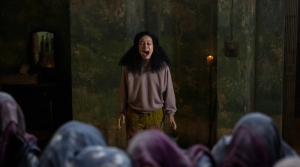Does Sandra die or is she healed at the Midnight Club? [Spoiler]
#Sandra #die #healed #Midnight #Club #Spoiler
Welcome guys to All Social Updates. Here you can Find complete information about all the latest and important updates about every matter from all around the world. We cover News from every niche whether its big or small. You can subscribe and bookmark our website and social media handles to get the important news fastest before anyone.Follow our website allsocialupdates.com on Facebook, Instagram , Twitter for genuine and real news.
Like many of the previous works Mike Flanagan has produced, The Midnight Club is not your typical horror show. It tells an intricate story about family, loss and coming to terms with it all while incorporating aspects of horror and mystery. The main character Ilonka, who is also the perspective character of the series, finds out at the beginning of the story that she has thyroid cancer. Ilonka learns about Brightcliffe Hospice when she is desperate for treatment, and she quickly persuades her foster father to help her get admitted to the facility.
After arriving at Brightcliff, Ilonka is introduced to the seven other humans already living there. One of them is Sandra (Annarah Cymone), who often has disagreements with other people due to her deep religious beliefs. In case you were curious whether or not Sandra was saved at the end of The Midnight Club, we have the answer for you.

The Midnight Club
Is Sandra dying or is she recovering?
Sandra is shown to both the general audience and Ilonka at the same time. Spence takes Ilonka on a tour of Brightcliffe and at one point they enter a chamber where Sandra and Natsuki are doing yoga poses together. We have learned that Sandra has been diagnosed with lymphoma. The further we get into the show, the clearer it becomes where Sandra fits in with the other characters. Because she is a believer in Christianity and has strong religious beliefs, she and other residents of the neighborhood, like Spence, don’t always see eye to eye.
Spence lived in a household that shared Sandra’s fiercely conservative and passionately religious values. On the other hand, unlike her, he has been alienated from his family, primarily from his mother, because he is gay and was diagnosed with AIDS. After the death of a resident, Sandra suggests that the community turn to religion. This causes Spence, who spent his childhood in the church, to become hostile towards Sandra. In a later part of the show, Sandra makes a peace offering to Spence by sharing the story she told during the Midnight Club meeting.
Sandra warns the others against engaging in such activities, while Ilonka investigates the possibility of using ancient Greek religion as a treatment; Despite this, she participates in the ritual the group performs in episode 6 to heal Anya. And it is at this point that the apparent contradictions in Sandra’s character are brought to light. Her ideas are diametrically opposed to what others are planning, but she is willing to go along despite this opposition because she wants to be there for the people she cares about.
At the beginning of the episode entitled “Anya” we are given the impression that she is set in the future. Only Anya from the whole group was able to successfully complete the ceremony. Everyone else has died, including Sandra. This later turns out to be incorrect. Anya has these experiences in her last dream before she dies and they are all connected.
During the same episode, Ilonka hears Dr. Stanton as she talks to someone else on the phone and overhears her mention that one of her patients is going home. Illonka begins to mistakenly believe that she is the one who was cured, even though Dr. Stanton specifically told her she’s not. In addition, she begins to believe that the ritual is the cause of everything. In the end it is discovered that Sandra is the one who will return home and it was just a case of misdiagnosis; it was not the result of any ancient rite.
Before leaving, Sandra confesses that she was responsible for a number of mysteries that transpired at the facility. She defends her behavior as saying she just wanted to instill optimism in others. Sandra has a variety of conflicting feelings about the whole situation. She is relieved that her condition is not life-threatening, but at the same time she feels suddenly cut off from other people. They were forced to meet due to the inescapable reality that their fates were intertwined. Suddenly this no longer applies to Sandra and she is afraid that her friends will turn their backs on her because of it. However, Sandra finds that their connection goes well beyond their shared diagnosis.